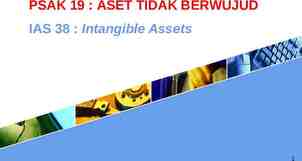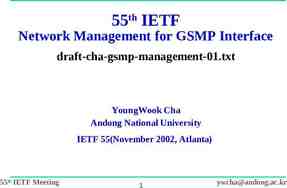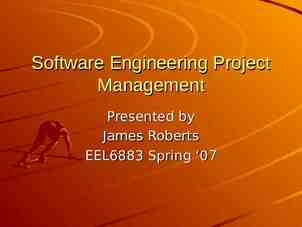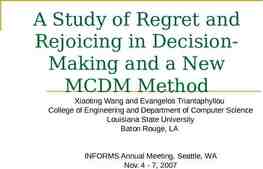Joint Conference on Digital Libraries, Portland, Oregon, July 15,
29 Slides6.18 MB

Joint Conference on Digital Libraries, Portland, Oregon, July 15, 2002 The Challenge of 3 Dimensional Data Storage, Preservation, Description, and Access Dr. Jeremy Rowe Head, Media Development, Information Technology Partnership for Research in Stereo Modeling Arizona State University

Partnership for Research In Stereo Modeling (PRISM) Established in Spring 1996 at Arizona State University to promote interdisciplinary research in 3D Data Acquisition, Visualization & Modeling, and Form Realization. PRISM includes researchers with a shared interest in visualizing 3D and higher dimensional data. Disciplines include: Anthropology Archaeology Biology Computer Science Educational Technology Fine Arts Industrial Engineering Mechanical Engineering

Data Acquisition Cyberware Laser Scanner Also: -Portable Laser Scanners -Confocal Microscope -CAT Scanner -Other Method of 3D Point Cloud Capture

Laser Scanning to Create Point Cloud Single Scan Multiple Scans Combine to Create Point Cloud Representing the Original Object

Surface Generation from Point Cloud Assemble Point Cloud from Multiple Scans (Geomagic) Point Cloud Triangular Mesh Surface

3D Imaging Moving Beyond Viewable Images Extending research capabilities beyond Image-Only 3D display such as QuickTime VR, Rhino, & Maya. Funding - National Science Foundation Digital Library/Knowledge and Distributed Intelligence Goals to work with Domain Researchers to Develop Processes to: Create A Quantifiable, Measurable Model Identify and Extract Data Create Catalog Information Populated Database

Surface Modeling Fitting a Modeled, Measurable Surface

Spatial Measures of Similarity Profile Curves Graphically illustrate symmetry And changes in curvature Also: Local Curvature Inflection Points Area Volume Proximity Orientation Etc. Goal - to provide objective measures of objects and component features

Range of Projects DNA in Fertilized Mouse Egg Through the Cell Biology Pilot project, we applied computer algorithms that enabled us to obtain more information from confocal microscope images.

Range of Projects Native American Ceramic Vessels Digital collections to analyze shape, morphology, manufacturing techniques, improve measurement accuracy, permit objective comparison of objects, document before repatriation.

Range of Projects Bone Surfaces and Forensics Digital collections to analyze shape, structure, morphology, improve measurement accuracy, permit objective comparison of objects, and to identify unique individuals.

Range of Projects Feature Extraction Morphology/Symmetry Region Identification Object Identification

Project Process Summary Development of vocabulary Development of XML schema and DTDs Capture/digitization Modeling and data extraction Volume modeling research Modeling software development Data extraction Data storage Text and tabular data Binary geometric/spatial data Point cloud data Polygonal mesh Surface/volume models Links to other databases Query and interaction Project Process Summary

Vocabulary

3D 3D Class Class Inheritance Inheritance Each subclass definition inherits generic attributes from its parent class and qualifies them or adds new ones Class:Object Attributes ::Surface model Shape representation model # features Plus. volume surface area ::Vessel Plus. Axis base plane Diameter circumference ::Jar Plus. Shoulder height aperture diameter

Addition of 3D Data to Relational Databases Conventional Relational Database Tables Tables added to accommodate 3D Metadata

User Interface applications (Java, Visual Basic, C ) Database organization 3D Query Processor Existing Data Access Protocols (ODBC, JDBC,XML) Text search Attribute Tables RDBMS (Oracle, SQL Server, etc) Custom 3D Data objects (Surfaces, Volumes) Spatial Search 3D Indexes

Query and Interaction Creating a Digital Library On Submit Query 1st CGI 1st JSP Binary and Text search criteria sent from interface Generate the contour type and parameterize the text query Query sent to Databases 1st Record set Database Initial query interface XSL/HTML display 2nd Record set 2nd JSP XML document Query database Pot ids of same contour 2nd CGI Curve matching X-Path/ display the selected pot Query result with thumbnails Detail display of individual pot

Examples of Current 3D Data Applications Environmental data GIS Air Quality Water Quality Built Environment Building Design (CAD/Architecture modeling) Building Documentation Ground Penetrating Radar Manufactured Objects Design/Production/Quality Control Catalog/Sale Medical CAT scans Ultrasound

Data Components Raw Data Textual 2D Image/surface 3D Spatial N-Dimensional Time Sensor data Derived Data Modeled Data Technical Data File Formats Applications Researcher Annotations (to permit reconstruction) “Bookmark” Information Documenting Searches/Interaction

Metadata Traditional textual info (Dublin Core, COPARES, etc.) Non-static information (audio, video, etc.) 2D data (from new and existing sources) 3D data (point cloud and modeled) Multi-dimensional data (i.e. vector, sensor, time, etc.)

Class based XML Schema *

Class based XML Schema *

Class based XML Schema *

Class based XML Schema

Other Issues Increasingly complex multi-dimensional data Development of standards File/storage formats Metadata/Cataloging/Description Researcher notations/version documentation “Bookmarking”/replicability of search results XML/SOAP search to replace/augment SQL search Migration Electronic records management of “Born Digital” data

3DK Project Team Priti Aggarwal Michael Bailey David Capco Gerald Farin Mark Henderson Adam Huang Raghu Krovvidi Mary Marzske Pornchai Mongkolnam S. Panchanathan B. Ramakrishna Jeremy Rowe Arleyn Simon David Van Alfen Myungsoo Bae D. Page Baluch Daniel Collins Patricia Green Jiu Xiang Hu Graham Jones Dezhi Liu Peter McCartney Greg Nielson Sandeep Pulla Anshuman Razdan Utsav Schurmans Matt Tocheri May Zsu
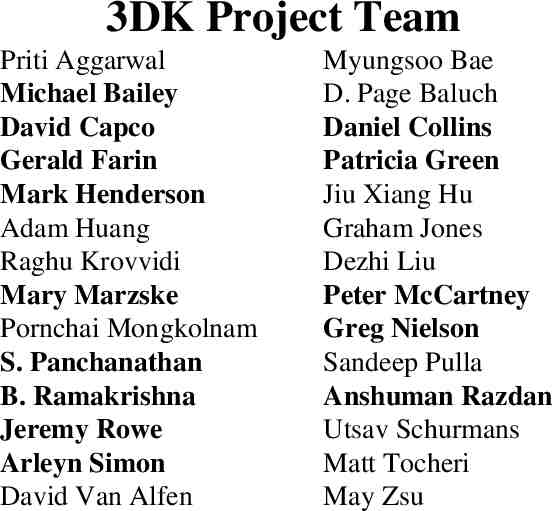
Contact Information Partnership for Research in Stereo Modeling (PRISM) at Arizona State University http://3dk.asu.edu Dr. Jeremy Rowe [email protected]


